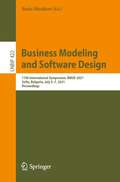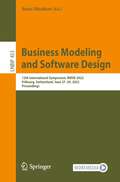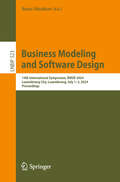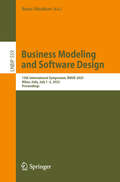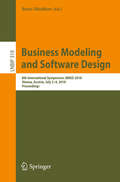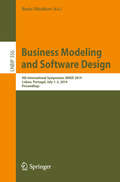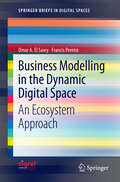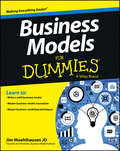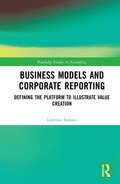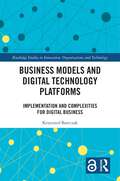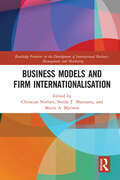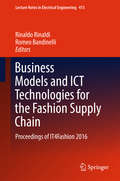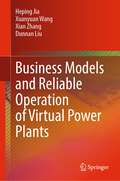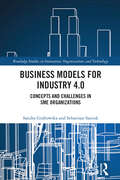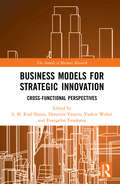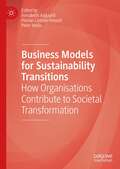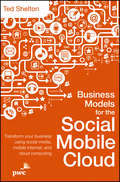- Table View
- List View
Business Modeling and Software Design: 11th International Symposium, BMSD 2021, Sofia, Bulgaria, July 5–7, 2021, Proceedings (Lecture Notes in Business Information Processing #422)
by Boris ShishkovThis book constitutes the refereed proceedings of the 11th International Symposium on Business Modeling and Software Design, BMSD 2021, which took place in Sofia, Bulgaria, in July 2021.The 14 full and 13 short papers included in this book were carefully reviewed and selected from a total of 61 submissions. BMSD is a leading international forum that brings together researchers and practitioners interested in business modeling and its relation to software design. Particular areas of interest are: Business Processes and Enterprise Engineering; Business Models and Requirements; Business Models and Services; Business Models and Software; Information Systems Architectures and Paradigms; Data Aspects in Business Modeling and Software Development; Blockchain-Based Business Models and Information Systems; IoT and Implications for Enterprise Information Systems. The BMSD 2021 theme was: Towards Enterprises and Software that are Resilient against Disruptive Events.
Business Modeling and Software Design: 12th International Symposium, BMSD 2022, Fribourg, Switzerland, June 27–29, 2022, Proceedings (Lecture Notes in Business Information Processing #453)
by Boris ShishkovThis book constitutes the refereed proceedings of the 12h International Symposium on Business Modeling and Software Design, BMSD 2022, which took place in Fribourg, Switzerland, in June 2022.The 12 full and 9 short papers included in this book were carefully reviewed and selected from a total of 56 submissions. BMSD is a leading international forum that brings together researchers and practitioners interested in business modeling and its relation to software design. Particular areas of interest are: Business Processes and Enterprise Engineering; Business Models and Requirements; Business Models and Services; Business Models and Software; Information Systems Architectures and Paradigms; Data Aspects in Business Modeling and Software Development; Blockchain-Based Business Models and Information Systems; IoT and Implications for Enterprise Information Systems. Each year, a special theme is chosen, for making presentations and discussions more focused. The BMSD 2022 theme is: Information Systems Engineering and Trust.
Business Modeling and Software Design: 14th International Symposium, BMSD 2024, Luxembourg City, Luxembourg, July 1–3, 2024, Proceedings (Lecture Notes in Business Information Processing #523)
by Boris ShishkovThis book constitutes the refereed proceedings of the 14h International Symposium on Business Modeling and Software Design, BMSD 2024, which took place in Luxembourg, during July 1-3, 2024. The 13 full and 7 short papers included in this book were carefully reviewed and selected from a total of 54 submissions. BMSD is a leading international forum that brings together researchers and practitioners interested in business modeling and its relation to software design. Particular areas of interest are: Business Processes and Enterprise Engineering, Business Models and Requirements, Business Models and Services, Business Models and Software, Information Systems Architectures and Paradigms, Data Aspects in Business Modeling and Software Development, Blockchain-Based Business Models and Information Systems, IoT and Implications for Enterprise Information Systems. Each year, a special theme is chosen, for making presentations and discussions more focused, and in 2024 it is: Towards Socially Responsible Information Systems.
Business Modeling and Software Design: 15th International Symposium, BMSD 2025, Milan, Italy, July 1–3, 2025, Proceedings (Lecture Notes in Business Information Processing #559)
by Boris ShishkovThis book constitutes the refereed proceedings of the 15h International Symposium on Business Modeling and Software Design, BMSD 2025, which took place in Milan, Italy, during July 1-3, 2025. The 9 full papers and 14 short papers included in these proceedings were carefully reviewed and selected from 48 submissions. BMSD is a leading international forum that brings together researchers and practitioners interested in business modeling and its relation to software design. Particular areas of interest are: Business Processes and Enterprise Engineering, Business Models and Requirements, Business Models and Services, Business Models and Software, Information Systems Architectures and Paradigms, Data Aspects in Business Modeling and Software Development, Blockchain-Based Business Models and Information Systems, IoT and Implications for Enterprise Information Systems.
Business Modeling and Software Design: 8th International Symposium, BMSD 2018, Vienna, Austria, July 2-4, 2018, Proceedings (Lecture Notes in Business Information Processing #319)
by Boris ShishkovThis book constitutes the proceedings of the 8th International Symposium on Business Modeling and Software Design, BMSD 2018, held in Vienna, Austria, in July 2018. The 14 full papers and 21 short papers selected for inclusion in this book deal with a large number of research topics: (i) Some topics concern Business Processes (BP), such as BP modeling / notations / visualizations, BP management, BP variability, BP contracting, BP interoperability, BP modeling within augmented reality, inter-enterprise collaborations, and so on; (ii) Other topics concern Software Design, such as software ecosystems, specification of context-aware software systems, service-oriented solutions and micro-service architectures, product variability, software development monitoring, and so on; (iii) Still other topics are crosscutting with regard to business modeling and software design, such as data analytics as well as information security and privacy; (iv) Other topics concern hot technology / innovation areas, such as blockchain technology and internet-of-things. Underlying with regard to all those topics is the BMSD’18 theme: Enterprise Engineering and Software Engineering - Processes and Systems for the Future.
Business Modeling and Software Design: 9th International Symposium, BMSD 2019, Lisbon, Portugal, July 1–3, 2019, Proceedings (Lecture Notes in Business Information Processing #356)
by Boris ShishkovThis book constitutes the refereed proceedings of the 9th International Symposium on Business Modeling and Software Design, BMSD 2019, held in Lisbon, Portugal, in July 2019. It contains 12 full and 11 short papers. BMSD is a leading international forum that brings together researchers and practitioners interested in business modeling and its relation to software design. Particular areas of interest are: Business Processes and Enterprise Engineering; Business Models and Requirements; Business Models and Services; Business Models and Software; Information Systems Architectures and Paradigms; Data Aspects in Business Modeling and Software Development; Blockchain-Based Business Models and Information Systems; IoT and Implications for Enterprise Information Systems. The theme of BMSD 2019 was: REFLECTING HUMAN AUTHORITY AND RESPONSIBILITY IN ENTERPRISE MODELS AND SOFTWARE SPECIFICATIONS.
Business Modeling for Life Science and Biotech Companies: Creating Value and Competitive Advantage with the Milestone Bridge (Routledge Studies in Innovation, Organizations and Technology)
by Antonella Zucchella Alberto OnettiMost books on the biotechnology industry focus on scientific and technological challenges, ignoring the entrepreneurial and managerial complexities faced bio-entrepreneurs. The Business Models for Life Science Firms aims to fill this gap by offering managers in this rapid growth industry the tools needed to design and implement an effective business model customized for the unique needs of research intensive organizations. Onetti and Zucchella begin by unpacking the often-used ‘business model’ term, examining key elements of business model conceptualization and offering a three tier approach with a clear separation between the business model and strategy: focus, exploring the different activities carried out by the organization; locus, evaluating where organizational activities are centered; and modus, testing the execution of the organization’s activities. The business model thus defines the unique way in which a company delivers on its promise to its customers. The theory and applications adopt a global approach, offering business cases from a variety of biotech companies around the world.
Business Modelling in the Dynamic Digital Space: An Ecosystem Approach (SpringerBriefs in Digital Spaces)
by Francis Pereira Omar A El SawyThis Springer Briefs volume guides the reader in a comprehensive form to design new digital business models. The book provides strategic roadmaps for enterprises in the digital world, and a comprehensive framework to assess new business models. It aligns both, research and a practical perspective through real case study examples. Even extreme scenarios are employed to ensure that innovative approaches are being considered adequately.
Business Models For Dummies
by Jim MuehlhausenWrite a business model? Easy.Business Models For Dummies helps you write a solid business model to further define your company's goals and increase attractiveness to customers. Inside, you'll discover how to: make a value proposition; define a market segment; locate your company's position in the value chain; create a revenue generation statement; identify competitors, complementors, and other network effects; develop a competitive strategy; and much more.Shows you how to define the purpose of a business and its profitability to customersServes as a thorough guide to business modeling techniquesHelps to ensure that your business has the very best business model possibleIf you need to update a business model due to changes in the market or maturation of your company,Business Models For Dummies has you covered.
Business Models Problem Set
by William A. Sahlman Ramana Nanda Robert F. White Hunter AshmoreExercise
Business Models and Corporate Reporting: Defining the Platform to Illustrate Value Creation (Routledge Studies in Accounting)
by Lorenzo SimoniThis book discusses the role of business models in corporate reporting. It illustrates the evolution of non-financial reporting, the importance of business model reporting, and the main conceptualisations of business models. It also offers a methodological contribution to the assessment of business model reporting. Finally, it discusses the main implication of business model reporting for different categories of subjects and some challenges related to this kind of disclosure. Readers will understand the role of business models in the non-financial reporting landscape. They will also gain an understanding of how business models can help users of the annual report contextualise other non-financial items disclosed. However, effective business model reporting implies paying attention to certain features that define its quality. This theme is discussed in the empirical part of the book and in the section devoted to implications for preparers, users, and regulators. As large companies in the EU and the UK have to disclose the business model in the annual report, this book will be of interest to preparers and users of financial statements, regulators involved in the ongoing non-financial regulatory process, and professional bodies. It will also be of interest to academics interested in the investigation of non-financial reporting.
Business Models and Digital Technology Platforms: Implementation and Complexities for Digital Business (Routledge Studies in Innovation, Organizations and Technology)
by Krzysztof BartczakThis book examines the influence exerted by digital technology platforms (DTPs) on changes to business models. The author identifies critical factors for the successful implementation and usage of such platforms, including barriers which may be related, for example, to the absence of sufficient knowledge about DTPs or the inability to obtain a sufficient amount of financial resources.Business Models and Digital Technology Platforms develops a comprehensive model of DTPs based on empirical research in Poland. It demonstrates how platforms influence changes in the operations of companies, their level of competitiveness, the consumer’s role in the process of joint development of innovations and the consumer’s experience as well as implications of the use of AI for the autonomy of DTPs.This book offers a unique, holistic understanding of the complexities involved and showcases their role within digital business. Combining theory with practice, this book is a valuable resource for researchers and academics of business model innovation, strategic management, innovation management, digital transformation and organisational change.
Business Models and Firm Internationalisation (Routledge Frontiers in the Development of International Business, Management and Marketing)
by Christian NielsenInternationalisation has been a binding request for firms dealing with the challenges of the present-day realities. Extant international business publications have recently begun to point out the relationship between the notions of ‘business model’ and ‘internationalisation’, yet the filed needs considerably more attention. The core aim of this book is to provide a comprehensive analysis of the ways in which business models and internationalisation impact one another in the process of initiating and expanding international business activities. The analysis makes it feasible to detect the core issues of the interdependences between business models and internationalisation to facilitate management decision-making and implementation of pertinent firm internationalisation incorporating the application of appropriate business models. In this book, the business model is applied to explore the specifics and aspects of firm internationalisation processes. Innovating the business model is analysed as a persuasive means for augmenting the propensities of firms to internationalise. The book enriches the comprehension of the significance of business model innovation as an enabler of firm internationalisation, in view that scares in what manners business model innovation facilitate firm internationalisation. The book chapters address a broad range of issues encompassing: the general roles of business model in firm internationalisation, the relationships between digital business models and platforms on one side and firm internationalisation on another, how business models determine the internationalisation of services firms, the interplay between business models and firm internationalisation in specific contexts. It will, therefore, be of interest to researchers, academics and advanced students in the fields of international business and management.
Business Models and ICT Technologies for the Fashion Supply Chain: Proceedings Of It4fashion 2016 (Lecture Notes In Electrical Engineering #413)
by Rinaldo Rinaldi Romeo BandinelliThis book presents high-quality original contributions on the fashion supply chain. A wide spectrum of application domains are covered, processing of big data coming from digital and social media channels, fashion new product development, fashion design, fashion marketing and communication strategy, business models and entrepreneurship, e-commerce and omni-channel management, corporate social responsibility, new materials for fashion product, wearable technologies. The contents are based on presentations delivered at IT4Fashion 2017, the 7th International Conference in Business Models and ICT Technologies for the Fashion Supply Chain, which was held in Florence, Italy, in April 2017, and at IT4Fashion 2018, the 8th edition of the same conference, which was held in Florence, Italy, in April 2018. This conference series represents a targeted response to the growing need for research that reports and debates supply chain business models and technologies applied to the fashion industry, with the aim of increasing knowledge in the area of product lifecycle management and supply chain management in that industry.
Business Models and ICT Technologies for the Fashion Supply Chain: Proceedings of IT4Fashion 2016 (Lecture Notes in Electrical Engineering #413)
by Rinaldo Rinaldi Romeo BandinelliThis book presents high-quality original contributions on the fashion supply chain. A wide spectrum of application domains are covered, processing of big data coming from digital and social media channels, fashion new product development, fashion design, fashion marketing and communication strategy, business models and entrepreneurship, e-commerce and omni-channel management, corporate social responsibility, new materials for fashion product, wearable technologies. The contents are based on presentations delivered at IT4Fashion 2016, the 6th International Conference in Business Models and ICT Technologies for the Fashion Supply Chain, which was held in Florence, Italy, in April 2016. This conference series represents a targeted response to the growing need for research that reports and debates supply chain business models and technologies applied to the fashion industry, with the aim of increasing knowledge in the area of product lifecycle management and supply chain management in that industry.
Business Models and People Management in the Indian IT Industry: From People to Profits (Working in Asia)
by Ashish Malik Chris RowleyThe global impact of so-called ‘offshoring’, including of information technology (IT) and related services, continues to be a topic of great interest to academics, practitioners and policy makers. The Indian IT industry has sustained high levels of growth in revenues and employment since the late 1980s. Even following the global financial crisis and meltdown in 2008, the industry has reported growth, albeit at a lower rate. Furthermore, the high rates of technological change and increased competition has forced businesses and managers to be innovative and create new business models. This book examines how managers and entrepreneurs in the Indian IT industry have explored and exploited human capital opportunities at various stages of the industry’s evolution to create innovative human resources (HR) practices and new business models. Based on extensive academic research and deep reflective practitioner accounts, this collection presents expert content, views and a coherent picture of the challenges and changes in the Indian IT industry and analyses how the industry has remained competitive in a constantly changing environment. This book will appeal to researchers, students and practitioners, particularly in the fields of human resources and strategic management.
Business Models and Reliable Operation of Virtual Power Plants
by Xian Zhang Heping Jia Xuanyuan Wang Dunnan LiuThis book focuses on the business operation of virtual power plants. Both of the business models and reliable operation of virtual power plants have been addressed with engineering practices. This is achieved by providing an in-depth study on several major topics such as load forecasting for distributed energy resources, business model and practice of virtual power plants, the business operation of virtual power plants participating in demand response, and auxiliary service market. The dynamic pricing strategy of virtual power plants and reliable operation of power systems with virtual power plants are provided as well. The comprehensive and systematic treatment in business operation of virtual power plants is one of the major features of the book, which is particularly suited for readers who are interested to learn operation mechanisms of virtual power plants. The book benefits researchers, engineers, and graduate students in the fields of energy internet, electrical engineering, and business administration, etc.
Business Models for Industry 4.0: Concepts and Challenges in SME Organizations (Routledge Studies in Innovation, Organizations and Technology)
by Sandra Grabowska Sebastian SaniukUtilizing Industry 4.0 technologies is essential to meet consumer expectations of personalized products and services but not without obstacles and challenges. This book provides comprehensive knowledge on the operating conditions and challenges of small- and medium-sized enterprises operating in the era of Industry 4.0 and proposes a Business Model 4.0 concept. The authors provide insights on the general conditions for the development of Economy 4.0 and Society 5.0, the expectations of modern consumers in product personalization, customization, servitization and the SME sector's requirements. In addition, the book offers a business model of cooperation between enterprises and the concept of rapid network prototyping methodology for the implementation of personalized products. It proposes the creation of e-business platforms that will allow for better integration of the customer with the manufacturer and the possibility of greater involvement in product configurations. The empirical research offered in this book will provide valuable insights for scholars and upper-level students across business disciplines, including strategic management, entrepreneurship, technology and innovation management.
Business Models for Strategic Innovation: Cross-Functional Perspectives (The Annals of Business Research)
by Demetris Vrontis Yaakov Weber Evangelos Tsoukatos S.M. Riad ShamsThis book extends our understanding of how different cross- functional business and management disciplines, such as innovation and entrepreneurship, strategic management, marketing and HRM, individually and collectively underpin innovation in business management. Business Models for Strategic Innovation develops insights from cross-disciplinary business knowledge streams and their cutting edge discipline-specific practical implications to create a cross- functional business innovation management model. Novel cross- disciplinary knowledge plays an imperative role in business innovation and we know that innovative management processes have significant implications for effective cross- functional management. In this context, each chapter of the book presents fresh insights on diverse business knowledge- streams as well as their applied implications on cross- functional business innovation management. Finally, centred on these cross- disciplinary business theories and their cutting edge implications, the last chapter of this book proposes a model of strategic cross- functional business innovation management process. This academically rigorous work uses innovative theoretical propositions and state- of- the- art empirical analysis in order to enable cross- functional management teams to support organisation- wide business innovation processes.
Business Models for Sustainability Transitions: How Organisations Contribute to Societal Transformation
by Peter Wells Florian Lüdeke-Freund Annabeth AagaardCan innovations in business change society? Can innovations in society change business? These two questions have become critically urgent in recent years, but are rarely considered together. ‘Business Models for Sustainability Transitions’ therefore asks, can contemplating both concepts together result in a flourishing, sustainable future? Technology alone cannot save us. We cannot consciously consume our way out of trouble. This book represents a start at bridging the dynamic world of business model innovation with the constant and unprecedented transitions underway in the world around us. For researchers, practitioners, and policy makers, the coupling of the two questions has the potential to unlock answers to our grand global challenges with responses that are at the same time rapid and enduring. This work offers unique and considered glimpses into what it may take to harness wide-ranging innovations for the collective good.
Business Models for Teams: See How Your Organization Really Works and How Each Person Fits In
by Yves Pigneur Tim Clark Bruce HazenAre you frustrated by...• Explaining and re-explaining what people on your team should do?• Solving problems that others should be able to solve for themselves?• Supervising and micromanaging, rather than strategizing and leading?Business Models for Teams will help you overcome these problems. It applies the same simple visual tools that made Business Model Generation and Business Model You so popular and successful around the world. In fact, this book may be the last teamwork toolkit you will ever need!Most leaders over-rely on verbal and written communications. But that approach is outmoded in today’s systems-driven world. Instead, the Business Model Canvas visually depicts how your team really works and how each person fits into the overall mission. It enables people to recognize what needs doing at any given moment—without being asked.
Business Models for the Circular Economy: A European Perspective (Sustainability and Innovation)
by Jan Stejskal Jens Horbach Wolfgang Gerstlberger Viktor ProkopIncreased ecological awareness and the growing scarcity of resources have led to the introduction of new environmental standards, triggering enterprises, regions, and even countries to adopt new business models and industrial reconversion approaches. However, despite increased interest in business models and their innovation, it still lacks the integration of circularity and sustainability and to date research on these areas is still limited. This book, therefore, provides readers with a closer picture of the issues of business models and their innovation for the circular economy in Europe, where the issues of sustainability and the shift towards the circular economy have become cornerstones of European policies and documents and where significant differences have been identified between firms and countries. This book provides a unique view of different European perspectives and enables the reader to compare the situation in countries with completely different historical and economic conditions as well as with different perceptions of the need for the actions leading to the sustainable development and to the shift towards the circular economy.
Business Models for the Social Mobile Cloud
by Ted SheltonFully exploit new conditions and opportunities created by current technological changesThe combined impact of social technologies, the mobile Internet, and cloud computing are creating incredible new business opportunities. They are also destroying unprepared companies, transforming industries, and leaving behind workers who are unwilling or unable to adapt. Business Models for the Social Mobile Cloud reveals a compelling view from PwC of how the social mobile cloud and a combination of new technology changes are key players in a digital transformation in business and society that is moving more quickly and cutting more deeply than any technology transformation ever seen.Explores a road map to success through adapting to technological changesWritten for businesses and leaders who want to understand how the coming technology changes will eventually impact their businessesFor companies to succeed, leaders must understand how to stay ahead of their competitors in adapting to the new conditions and opportunities. In Business Models for the Social Mobile Cloud, PwC's Ted Shelton describes the tectonic changes currently underway--and to come--plus why they are happening, what to expect, and what you must do about.
Business Models in the Circular Economy: Concepts, Examples and Theory
by Roberta De AngelisThis book focuses on the role of corporations in the transition towards an economy that works more in line with ecological limits. It is centred on business model innovation in the context of the circular economy, which is gaining consensus across business, policy and academic circles by proposing more resource efficient industrial processes. Interest in circular business models is growing within academic and practitioner literature yet the concept is not clearly understood, with potential negative consequences for theory building and practical implementation. Therefore, this book conceptualises circular business models and investigates their theoretical foundations in relation to the rationale for adopting them, drawing on circular economy, business model, strategic management and neo-institutional literature and secondary data.
Business Models: A Research Overview (State of the Art in Business Research)
by Francesco Paolone John Dumay Christian Nielsen Morten Lund Marco Montemari Maurizio MassaroThe growing body of research on business models draws upon a range of sub-disciplines, including strategic management, entrepreneurship, organization studies and management accounting. Business Models: A Research Overview provides a research map for business scholars, incorporating theoretical and applied perspectives. It develops the field of business model research by offering a critique of the field as it has developed to date and provides a guide for future research and theorization. The research performed as a basis for this book improves and extends prior subjective and less-documented work by using a scientific approach to identifying impactful research. The book argues that business model research is a mature field and that future research should focus on performative and ecosystem-based contributions, with the timely identification of four distinct stages of business model research. The study here provokes a new set of research questions, which are addressed in the concluding passages of Chapters 5–8, as a point of departure for those researching business models. This book is essential primary reading for scholars and practitioners of business models who are looking to seek out new knowledge and build new perspectives.
